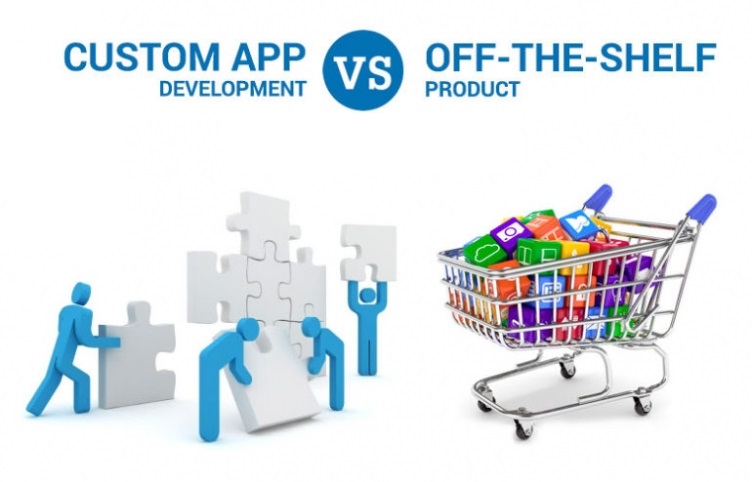Intro
These days, it is impossible to imagine a company growing without automating at least some of its business processes first. That is why software solutions for process automation is a multi-billion sector on the digital market that doesn’t seem to decrease in demand anytime soon. Every company seeking to enhance its business operations eventually faces the need to choose between custom vs. off-the-shelf software, which isn’t always an obvious choice to make. Understanding the difference between these two strategies is key to make the right decision. In today’s post, we are comparing the ready-made and custom software to help you find out which one of the two would fit you better.
Custom vs. Off-The-Shelf: Definitions and Meaning
Before jumping to comparison, we should first go through the definitions of both terms we’re operating here.
Custom software stands for planning, designing, developing, and then technically supporting a program from scratch for a specific client, be it a company or individual. In other words, you make up an idea of a software product in your imagination, and then a software development team implements it for you through coding. Of course, the end product will be as close to the one of your imagination as technically achievable. Custom software development, on top of everything else, is created to meet the unique needs of businesses who either struggle to find a suitable solution among commercial software or see extra potential in launching their own digital product.
Off-the-shelf software, also called commercial, commercially available or existing, is a ready-made product with a particular set of features that you can buy as a single-time purchase or as a monthly/yearly subscription. As an end-user, you have nothing to do with how the software looks or works, but can slightly adjust it to your requirements if the software provider enables you to. In terms of the business management niche, the most famous commercial software products are SalesForce, Oracle, HubSpot, Zoho, Microsoft Dynamics, and Creatio.
Factors to Compare
Off-the-shelf:
- Generally available
- Quick implementation
- Ability to preview and try beforehand
- Lower set-up cost
Custom
- Unique & tailored to your needs
- Scalable
- Data-secure
- Lower maintenance cost
Cost & Value
The first factor that influences the decision-making process when it comes to software is the price tag. However, we believe that discussing the costs for commercial and custom solutions without comparing the value of each would be just taken out of context. It is a common fact that creating your own software costs more than purchasing a commercial suite. However, this is relevant only for the initial setup, meaning the starting point of your automation journey. When a company manages its operations manually and wants to change it for automation, of course in the short term it would take less money to simply buy a program. But in the long term, the use of commercial programs makes companies spend way more on technical support, maintenance, and customization in comparison to budgets spent on custom software.
To sum up, we can surely state that custom solutions require more resources for the initial launch, but save you money on future operating support, as opposed to off-the-shelf ones.
Product Ownership & Scalability
The fact of launching a software product under your brand releases many additional ways to use it in the future, on the top of its initial intended use. Many companies, whose motivation behind a software project was to solve their own operational problems, overtime transformed into software providers their industry peers.
That’s what we mean by scalability: owning a digital product, you can one day turn it into a source of extra income rather than just an internal management tool. A program that once fulfilled your needs perfectly, has high chances to become a great fit for many companies you share the industry sector with. As with the off-the-shelf products, you can enjoy using them for your professional needs but that is just it.
Deploy & Development
Any high-performing digital product hides months or even years spent on its development, quality testing, debugging, and polishing. This statement is relevant for both commercially available and custom software. However, in the first case, all the development and deployment processes remain behind the scenes for end-users, and they get access to software only after it is market-ready and fully usable.
The situation is quite opposite with witnessing how something’s created from scratch. Directly participating in the release, you will face all the pitfalls of developing a software product, as well as learn how to find a way to overcome them in the future. As you can see, the commercial systems are an easier way to go, but custom projects provide irreplaceable experience to all the participants.
Usability & Customization
Comparing off-the-shelf vs. custom software in terms of usability might be a tough thing for a few reasons. The first one would be the fact that commercial software markets itself as a very diverse, adjustable, customizable, and adaptive. And it’s not we’re arguing about it; you really can purchase, let’s say, a ready-made CRM system that would have a thousand features and seem to provide the level of usability you could only dream of. But stop here and ask yourself: will you really use all of them? And does that system provide coverage to all the scenarios from your practice including the uncommon ones?
The truth is, regardless of what sales agents of commercial software are telling you, the functionality of a custom software will always be more balanced, suitable, and, at the end of the day, just better. In this case, you don’t add anything unnecessary to the feature set in the first, so fewer functions don’t make the end product less powerful. Vice versa, each and every component manually picked and added by your team adds value to the usage of it while keeping it uncluttered and easy to navigate.
Data Security
When talking about off-the-shelf software purchase, you can’t just get a program in exchange for your money and use it as you wish without the software provider’s consent. Servers and cloud storage for your business data will also belong to the company that you bought the software from. In other words, installing a program owned by a third party, you make your confidential information disclosable. Also, be aware that an agreement you will be forced to sign with your software provider most likely will state that you allow gathering your operational data for statistical purposes by the commercial side of the deal.
With the custom software, you can keep all the business-related information as secure as possible, because it’s only your technical team who can access it. As a product owner, from the very start of the project you will control and manage everything from the idea behind your software solution to the feature set, design, and servers to store and process your data.
Employee Training
We all know that user-friendliness is an obligatory trait of good software, be it commercially available or custom example. But trust us, no program is friendly to the point it allows you to skip the employee training before the implementation. Before you can surely state that every member of your team is an experienced user of the software you all collectively chose, the internal company operations just won’t be managed effectively. It is true that the whole business process automation concept is about decreasing human error at the workplace, however, it only achieves that if humans are trained appropriately.
Our background with delivering custom software solutions to small and mid-sized businesses proves that if the team gets directly involved in the software creation process from the very beginning, the need to train them when the project is finished is very low — they just already know what the program is all about. The training process in this case is seamless and very short in time, which positively affects the outcomes for the company.
Summary
A software solution is not an end in itself, but an answer to certain problems a company is facing. So it will only be effective and valuable, if tailored to the unique requirements of your team, in any other case you’re risking to make the situation worse than it was initially.
When choosing between commercial vs. custom software, balance the company’s needs with long-term consequences of both options. Each type of business automation software has its advantages and limitations, so it all depends on your particular preferences and requirements. If you still aren’t sure which way you should go, do not hesitate to reach us for technical advice or even your own custom software project.



